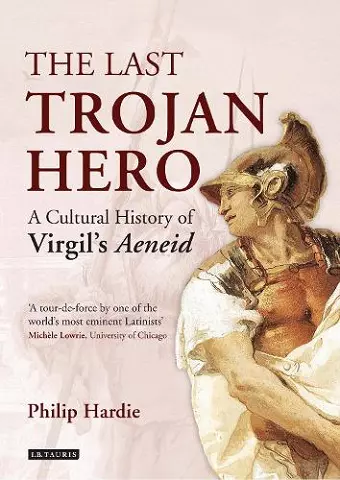The Last Trojan Hero
A Cultural History of Virgil's Aeneid
Format:Paperback
Publisher:Bloomsbury Publishing PLC
Published:6th Nov '15
Currently unavailable, and unfortunately no date known when it will be back

The rich and remarkable legacy of Ancient Rome's greatest literary treasure.
"I sing of arms and of a man: his fate had made him fugitive: he was the first to journey from the coasts of Troy as far as Italy and the Lavinian shores." The resonant opening lines of Virgil's Aeneid rank among the most famous and consistently recited verses to have been passed down to later ages by antiquity. And after the Odyssey and the Iliad, Virgil's masterpiece is arguably the greatest classical text in the whole of Western literature. This sinuous and richly characterised epic vitally influenced the poetry of Dante, Petrarch and Milton. The doomed love of Dido and Aeneas inspired Purcell, while for T S Eliot Virgil's poem was 'the classic of all Europe'. The poet's stirring tale of a refugee Trojan prince, 'torn from Libyan waves' to found a new homeland in Italy, has provided much fertile material for writings on colonialism and for discourses of ethnic and national identity. The Aeneid has even been viewed as a template and a source of philosophical justification for British and American imperialism and adventurism.
In his major new book Philip Hardie explores the many remarkable afterlives - ancient, medieval and modern - of the Aeneid in literature, music, politics, the visual arts and film.
'In his new book Philip Hardie not only tells the story of Virgil's Aeneid, but also of a significant part of western culture. As one would expect from this author, it is a masterful selection and presentation of the rich material at his command. Pursuing the reception of the central text (which is itself already an instance of reception) leads to intriguing insights into the development of literature, art, science and scholarship from antiquity to the present day. Hardie's unrivalled knowledge of Virgil and of later periods means that one learns as much about the Aeneid itself as about its later reception. A careful selection of relevant examples opens up a number of different perspectives and creates the framework for a comprehensive history of the legacy of this major epic. At the same time, this is such a well-written book that it will be accessible to all kinds of readers, specialist or not: it can enjoyably and rewardingly be read from cover to cover. Anyone interested in the history of epic will benefit from it and (re)discover new friends and old acquaintances.' Gesine Manuwald, Professor of Latin, University College London; 'Fast-paced and learned, The Last Trojan Hero is a tour-de-force through the reception of Virgil's Aeneid. One of the world's most eminent Latinists has condensed a lifetime of research into a slim volume whose every page offers a dazzling wealth of ideas clearly expressed - a delight for the specialist and the uninitiated alike. Some adaptations are as well known as Dante's underworld and the Christian Virgil, some are surprises, such as queen Elizabeth I in Dido's guise and the American Aeneas. Hardie ranges over German, Spanish, French, Italian, English, and Portuguese as he collects nods to Virgil in art and literature from Europe, the Americas, Asia, and Africa with a span from Ovid to Ursula Le Guin. More than a collection of references with rich visual documentation, Hardie offers a reading of the Aeneid, its heroes and heroines, its stance on foundation, empire, exile, and passion through its variegated reception. His light touch and the simplicity of the presentation belie the depth of thought on display.' Michele Lowrie, Professor of Classics and the College, University of Chicago; 'The Last Trojan Hero will become the primary resource for anyone interested in the reception of Virgil and his poetry, and it will serve as an excellent introduction to the topic for undergraduates and the general educated reader. But it is also a book I would recommend to anyone approaching Virgil for the first time. Hardie skilfully combines a sense of Virgil's place in ancient literary culture, a masterful overview of debates about the Aeneid in Classical scholarship, and a panorama of poetic, artistic and political responses to the epic. Insightful readings are presented throughout, of texts from Ovid - Virgil's "earliest reader" - to Seamus Heaney. The Aeneid's influence is traced through scatological travesty, the work of nation-building, and personal voices of protest or desire. The reader comes away from The Last Trojan Hero with a profound sense of how and why Virgil's poem mattered at different times and in different places. Hardie achieves a fine balance of encylopaedic scope and detailed reading, covering with a light touch an extraordinary breadth of material. His learning and interpretative sensibility brilliantly illuminate each text under discussion.' Ellen O'Gorman, Senior Lecturer in Classics, University of Bristol; 'I enjoyed Philip Hardie's book immensely. It is not only a treasure trove of information about the ways Virgil's Aeneid has been read, but also a subtle and complex reading of the text itself, as well as a richly emotional engagement with Western culture. Written by one of the most important living scholars of the Aeneid and its reception, this rich and resonant book will endlessly reward its readers, regardless of whether or not they are already familiar with Virgil's masterpiece.' Helen Lovatt, Associate Professor in Classics, University of Nottingham
ISBN: 9781784534837
Dimensions: unknown
Weight: 387g
262 pages